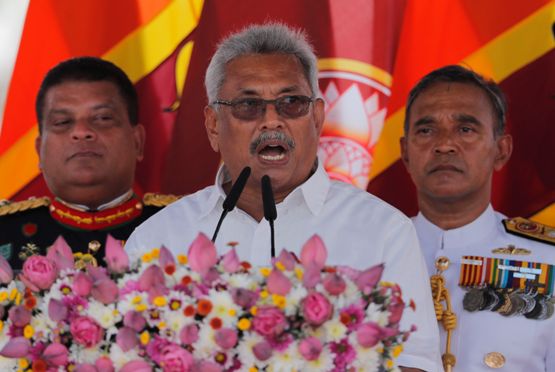Sri Lanka emergency temporary, says minister as opposition fears authoritarianism
COLOMBO – Sri Lanka’s controversially invoked emergency regulations are a temporary measure that will be in effect only until legislation is introduced to control alleged food-hoarding by traders, a cabinet spokesman said as allegations mounted of creeping authoritarianism.
Fielding questions at the weekly cabinet briefing, co-cabinet spokesman Ramesh Pathirana denied the regulations were an attempt to stifle dissent.
“Protests have been held since President Gotabaya Rajapaksa was elected. There were protests just a few weeks ago even when the COVID-19 crisis had reached a dangerous level. Since he came to power, President Rajapaksa has declared a designated protest site and not a single water canon or baton strike has been reported. The right to free speech and the right to protest and all other freedoms have been ensured,” said Pathirana, though critics contend that some protestors have been sent to forced quarantine.
“There is also clear public resentment toward traders who hoard and cheat the people,” he added.
Opposition lawmakers have expressed concern over a state of emergency they claim has been effectively declared through emergency regulations on food distribution invoked by President Rajapaksa on August 30.
The president also appointed a military major general as a commissioner-general of essential services to seize and take over food stocks and warehouses.
The main opposition Samagi Jana Balawegaya (SJB) has said the regulations, issued under Part II of the Public Security Ordinance, amount to a state of emergency, and insist it has been declared in bad faith.
“… the purported declaration of a state of emergency has been made in bad faith, with the ulterior motive of further wrongfully restricting the fundamental rights of the citizenry, and moving further in the direction of authoritarianism,” the SJB said in a statement on September 1.
A day after a state of emergency was declared, sugar stocks in several warehouses were seized by the Consumer Affairs Authority (CAA), the main price control agency that analysts say has created shortages in cooking gas and milk powder with price controls.
SJB MP Eran Wickramaratne speaking in Parliament on Monday (6) questioned the link between emergency and food shortages, and said if there were hidden stocks as claimed by the government, there were provisions in the CAA Act itself that could be used to deal with the situation. The Disaster Management Act No 13 of 2005 could also be used, the MP said.
“Through these emergency proclamations, the president has the power to suspend civil liberties, arrest and detain any citizen without a court order, suspend laws of the country, enter any premise without a court order and seize privately owned property,” he pointed out..
Agriculture Minister Mahindananda Aluthgamage told Parliament on Monday that the house was bypassed and emergency proclaimed through gazette for expediency and speed.
To draw up a law, go through the Legal Draftsman, the Attorney General will take at least three months to pass the legislation, he said.
This sentiment was echoed by the co-cabinet spokesman on Tuesday (7), who said, “We have realized that some of the provisions in the Consumer Protection Act are not strong enough. Drafts are underway to strengthen them. But this will take time, as it requires the approval of the attorney general.”
The time taken for the draft laws to be challenged in court and the time taken to present them to Parliament also has to be accounted for, he added.
“This [emergency] has been invoked with those considerations in mind, in response to the situation with regard to food. The government has no plan to continue it in the long term,” he said.
-economynext.com


